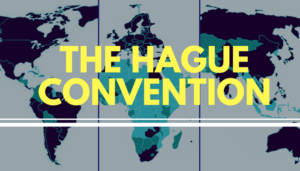American parents involved in international custody fights in Brazil have managed to get presidents, secretaries of state and lawmakers to help settle high-profile disputes that have long been a thorn in bilateral relations.
In the latest case, Chris Brann, a Houston physician, has found a unique way to gain leverage over his former spouse, enlisting federal prosecutors to step in.
On Wednesday, F.B.I. agents arrested his ex-wife’s parents when they landed in Miami and charged them with international parental abduction. In a tactic that experts in international custody fights described as unprecedented, Mr. Brann then signaled that the criminal case against them might be dismissed if his ex-wife were to return their son, Nicolas, to the United States immediately.
“Ultimately, I felt like this was the last hope,” Mr. Brann said in a telephone interview on Wednesday afternoon. “What’s in my child’s best interest is to have both parents in his life.”
While it is up to prosecutors to move forward with or dismiss a case, they often defer to the wishes of those making the underlying allegations, particularly when their testimony is crucial to prove allegations before a jury.
The grandparents in this case, Carlos Otavio Guimaraes, 67, and Jemima Guimaraes, 65, were taken into custody early Wednesday at Miami International Airport, where they were informed that they had been charged in a criminal complaint filed under seal by federal prosecutors in Texas last March.
Prosecutors often keep criminal cases sealed until defendants are within their reach.
The complaint alleges that the couple helped their daughter, Marcelle Guimaraes, move her son to her native Brazil, where she then applied for sole custody of him, in violation of a legal agreement with Mr. Brann.
If convicted of the charges against them — international parental kidnapping and conspiracy — each would face up to five years in prison. They are being held in a federal detention center until a bail hearing scheduled to take place on Monday morning.
Hours after the couple — who hold dual American and Brazilian citizenship — were taken into custody, Mr. Brann issued a statement saying he was “very sorry it has come to this.” Then he added, “If Nico is immediately returned to Houston, I am prepared to ask the U.S. Attorney’s Office to be lenient in how it handles Carlos and Jemima’s cases.”
Efforts on Wednesday to reach Marcelle Guimaraes, 39, by phone at her workplace in Salvador, Brazil, were unsuccessful. Rick Flowers, a Houston lawyer who represented her parents in a similar civil case, declined to comment.
The complaint says that Ms. Guimaraes, who is also charged in the case, used the pretext of a family wedding to get Mr. Brann’s permission to allow Nicolas to travel to Brazil.
Prosecutors allege that the maternal grandparents helped their daughter resettle with her son permanently in Brazil in July 2013, even though doing so violated a legal agreement that she and Mr. Brann had signed in Texas that May.
Soon after arriving in Brazil that July, Ms. Guimaraes filed for sole custody of the child in a Brazilian court and, according to the complaint, for weeks misled her ex-husband about her decision to remain permanently.
An F.B.I. special agent, Christopher Petrowski, wrote in the charging document that the grandparents were complicit in the deception, citing as evidence that the child had been enrolled months before the trip in a school in Salvador, in the Brazilian state of Bahia, that is run by the elder Ms. Guimaraes.
Mr. Petrowski also wrote that Mr. Guimaraes — a senior executive at ED & F Man, a multinational agricultural commodities company — misled Mr. Brann about his daughter’s intentions by emailing him flight itinerary information suggesting that the mother and child intended to fly to America in early August 2013.
Mr. Brann is among numerous American parents who have waged protracted and costly legal battles in Brazil in the hopes of getting their children back to the United States. Such cases fall under The Hague Abduction Convention, a 1988 international agreement aimed at facilitating the return of children removed from their “habitual residence” in violation of custody agreements.
While Brazil has signed the agreement, cases tend to languish in the country’s courts for years, and experts say judges seldom rule in favor of non-Brazilian parents. Since 2005, the State Department has considered Brazil to be “noncompliant” with the convention. In its 2017 report on international child abduction cases, the State Department said that “judicial authorities in Brazil persistently failed to regularly implement and comply with the provisions of the Convention.”
Mr. Brann and Ms. Guimaraes were married in Texas in February 2008 and had Nicolas, their only child, a year later. Ms. Guimaraes filed for divorce in September 2012, and the couple shared custody of Nicolas for several months. Ms. Guimaraes was granted permission to take their son to Brazil twice, under legal agreements filed in Texas.
In September 2013, Ms. Guimaraes disclosed to Mr. Brann that she intended to remain in Brazil. “I have better conditions to raise our son, and I am willing to talk about visitation,” she wrote in an email included in the complaint. “My wish is that we can get into an agreement soon, so we can all move on with our lives.”
In the interview, Mr. Brann said he had often struggled to get permission to see his son in more than 20 trips to Brazil since 2013.
He said he hoped to reach a deal that would allow Nicolas to be raised by his mother and father. “It will take time to rebuild trust,” Mr. Brann said, “but I truly believe we can get to a point where Nico can spend time with both parents.”
By Ernesto Londoño






